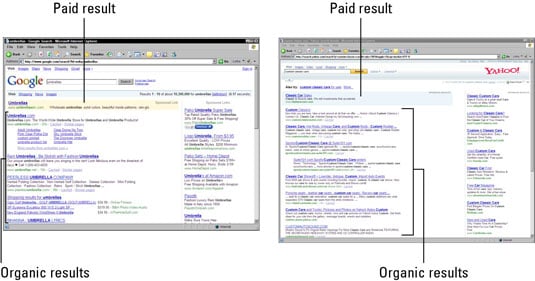When a search engine returns its search results, it gives you two types: organic and paid. Organic search results are the Web page listings that most closely match the user’s search query based on relevance.
Also called “natural” search results, ranking high in the organic results is what SEO is all about.
Paid results are basically advertisements — the Web site owners have paid to have their Web pages display for certain keywords, so these listings show up when someone runs a search query containing those keywords.
On a search results page, you can tell paid results from organic ones because search engines set apart the paid listings, putting them above or to the right of the organic results, or giving them a shaded background, border lines, or other visual clues.
The following figure shows the difference between paid listings and organic results.

The typical Web user might not realize they’re looking at apples and oranges when they get their search results. Knowing the difference enables a searcher to make a better informed decision about the relevancy of a result.
Additionally, because the paid results are advertising, they may actually be more useful to a shopping searcher than a researcher (as search engines favor research results).
Is organic search or paid search better?
Even with a better perspective of organic search vs. paid search, you may still wonder, “Is organic search or paid search better?”
There isn’t a definitive answer to that question. Most digital marketers, however, agree that organic search and paid search offer enough benefits to make using both worth it.
Should businesses use organic or paid search or both?
Most businesses benefit from using organic search and paid search in their online marketing strategy.
Since organic search and paid search feature unique benefits, they’re useful for achieving different goals in your strategy.
If you want to promote a new service, for example, then paid search is an excellent channel. In comparison, organic search may work well for an existing product with low demand.
To find which channel your company should use for your goals, outline what you want to accomplish. Then, match that goal with the channel(s) that can help you achieve that goal.
Your ad campaign for a new service, for instance, may also feature an optimized service page for organic search.
